Comprehensive Analysis of IFRS Implementation in Singapore
VerifiedAdded on 2022/12/21
|11
|2398
|89
Report
AI Summary
This report provides an analysis of the implementation of International Financial Reporting Standards (IFRS) in Singapore, examining the benefits and challenges faced by Singaporean companies. The report begins with an introduction to IFRS and its role in enhancing transparency and fairness in financial reporting. It then delves into a discussion supported by various research articles, exploring the impact of IFRS on fair value assessments, corporate value, earnings management, and financial statement comparability. The rationale for the study is to identify the advantages that Singaporean companies gain from adopting IFRS guidelines. The report addresses key research questions, such as the challenges of IFRS implementation, the assessment of fair value, and the needs for implementing IFRS guidelines. The conclusion summarizes the positive impacts of IFRS on accounting policies in Singapore, highlighting improved transparency and reduced earnings management practices. The report includes an executive summary, table of contents, and a comprehensive list of references.
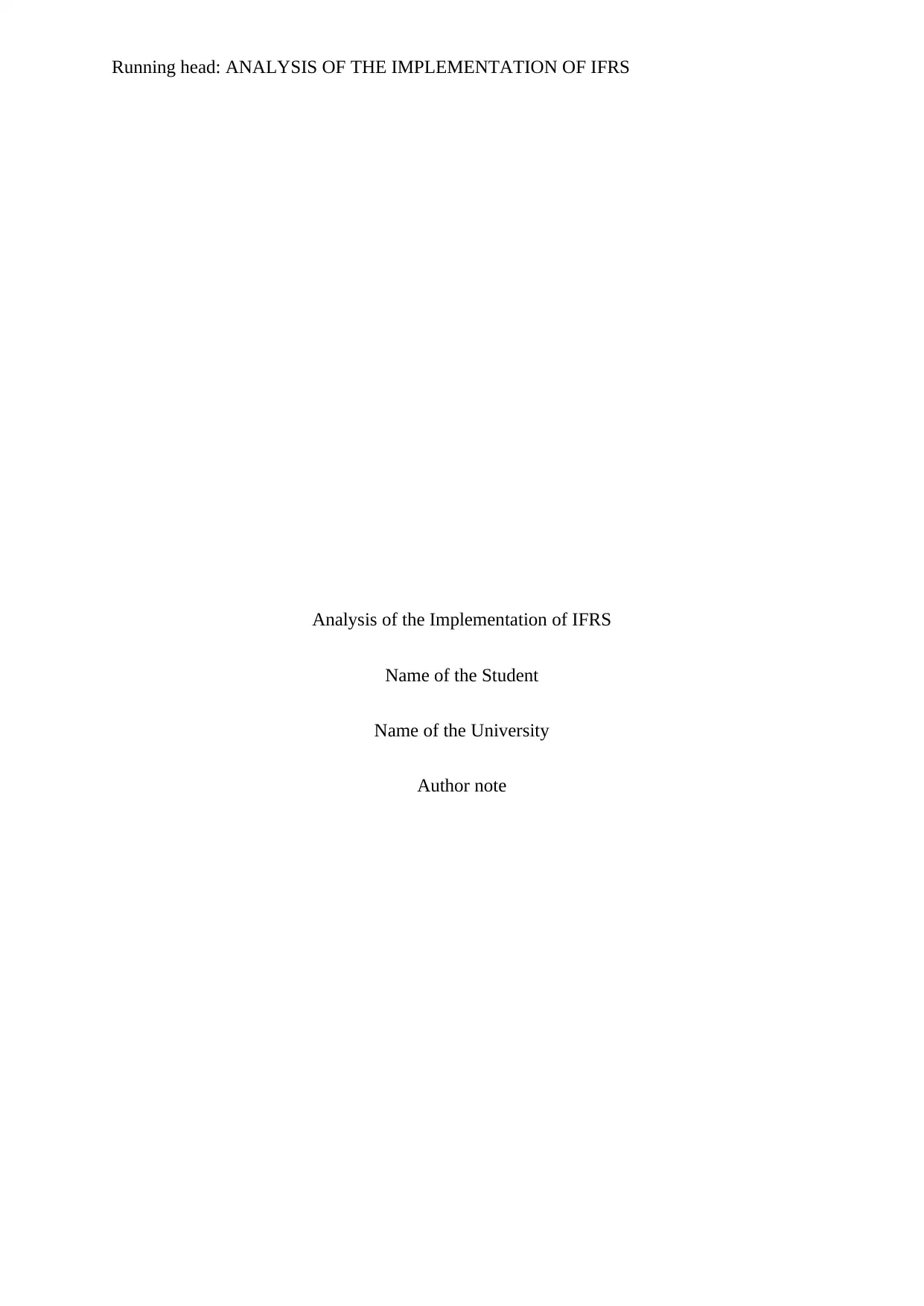
Running head: ANALYSIS OF THE IMPLEMENTATION OF IFRS
Analysis of the Implementation of IFRS
Name of the Student
Name of the University
Author note
Analysis of the Implementation of IFRS
Name of the Student
Name of the University
Author note
Paraphrase This Document
Need a fresh take? Get an instant paraphrase of this document with our AI Paraphraser
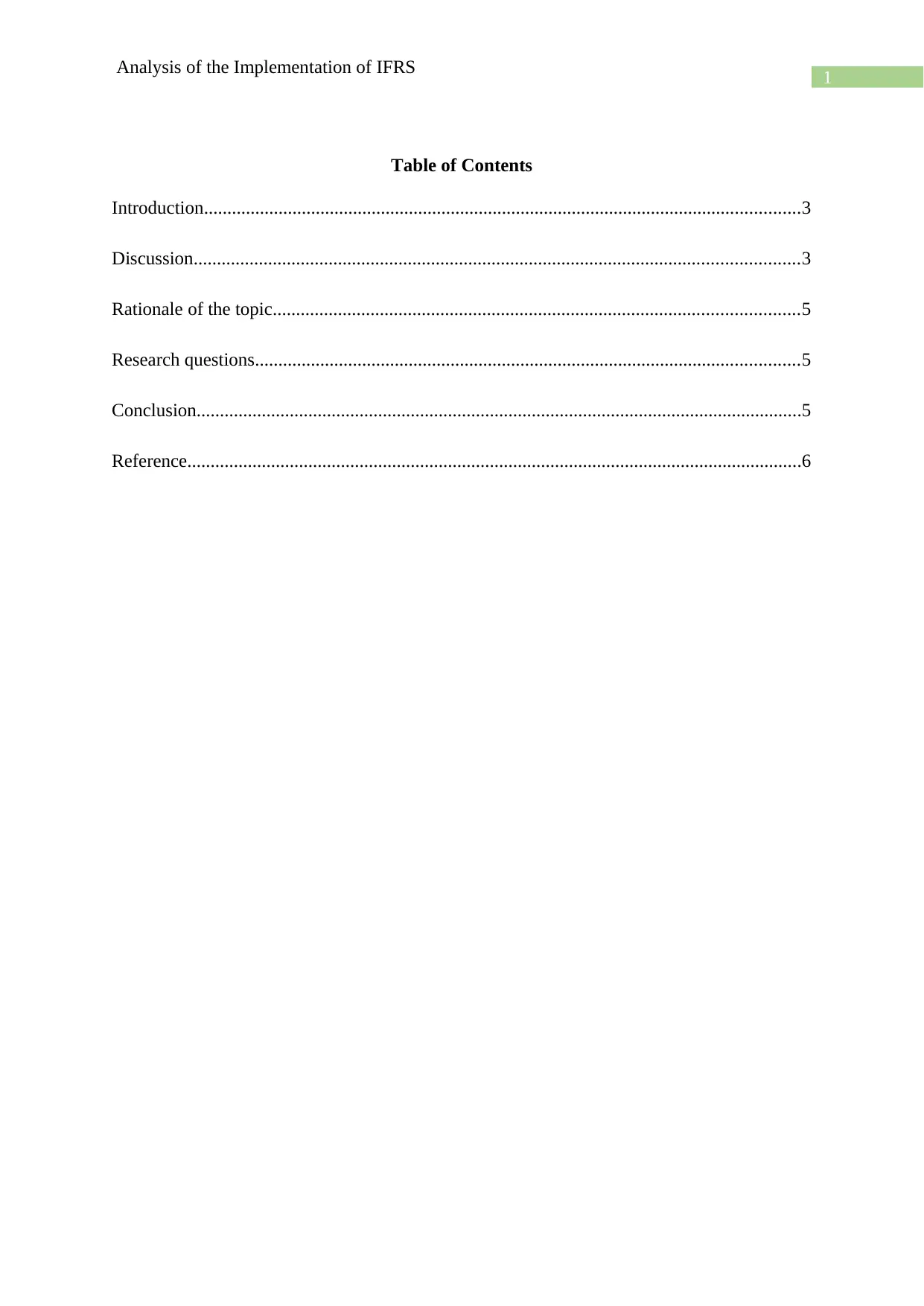
1
Analysis of the Implementation of IFRS
Table of Contents
Introduction................................................................................................................................3
Discussion..................................................................................................................................3
Rationale of the topic.................................................................................................................5
Research questions.....................................................................................................................5
Conclusion..................................................................................................................................5
Reference....................................................................................................................................6
Analysis of the Implementation of IFRS
Table of Contents
Introduction................................................................................................................................3
Discussion..................................................................................................................................3
Rationale of the topic.................................................................................................................5
Research questions.....................................................................................................................5
Conclusion..................................................................................................................................5
Reference....................................................................................................................................6
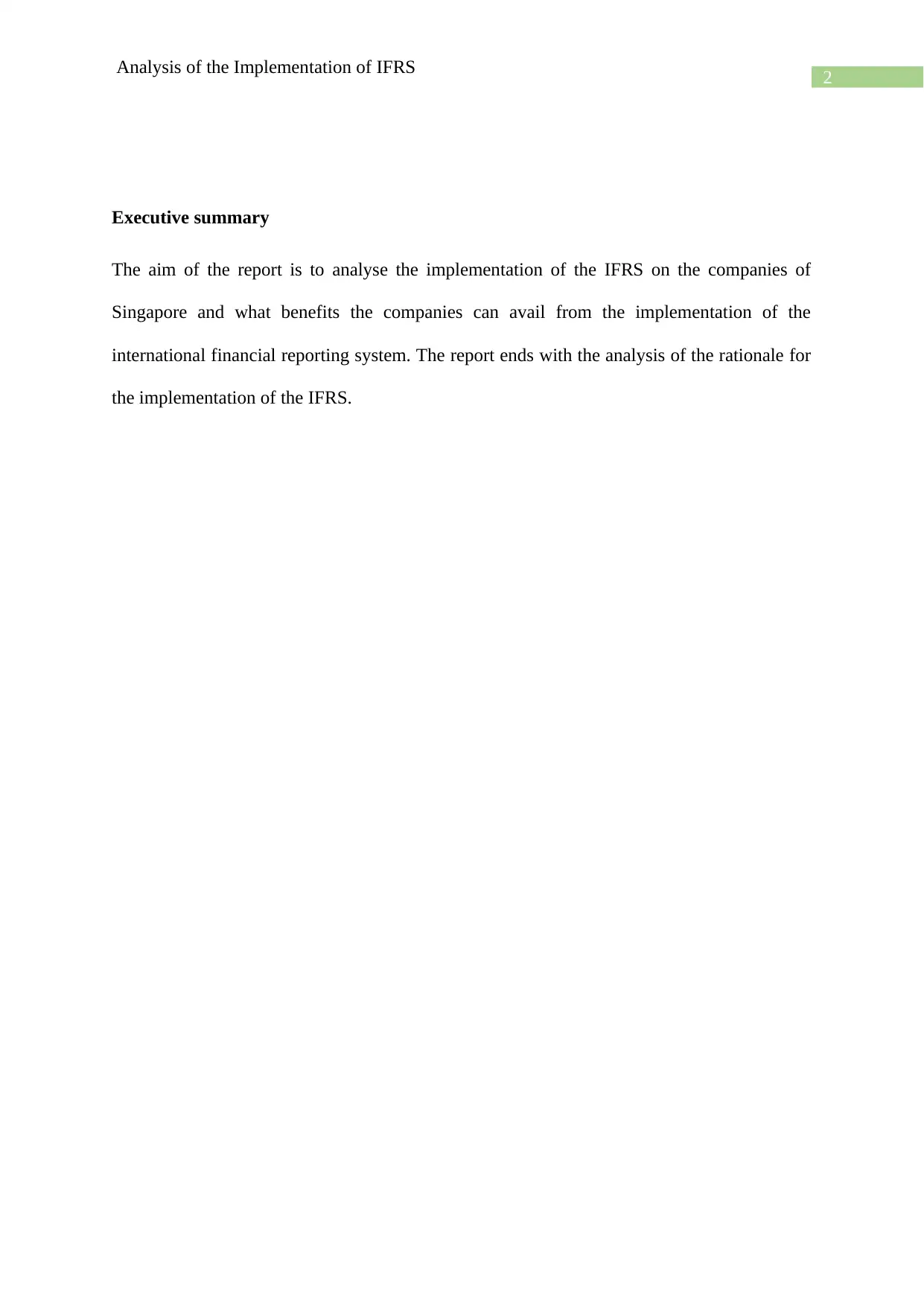
2
Analysis of the Implementation of IFRS
Executive summary
The aim of the report is to analyse the implementation of the IFRS on the companies of
Singapore and what benefits the companies can avail from the implementation of the
international financial reporting system. The report ends with the analysis of the rationale for
the implementation of the IFRS.
Analysis of the Implementation of IFRS
Executive summary
The aim of the report is to analyse the implementation of the IFRS on the companies of
Singapore and what benefits the companies can avail from the implementation of the
international financial reporting system. The report ends with the analysis of the rationale for
the implementation of the IFRS.
⊘ This is a preview!⊘
Do you want full access?
Subscribe today to unlock all pages.

Trusted by 1+ million students worldwide
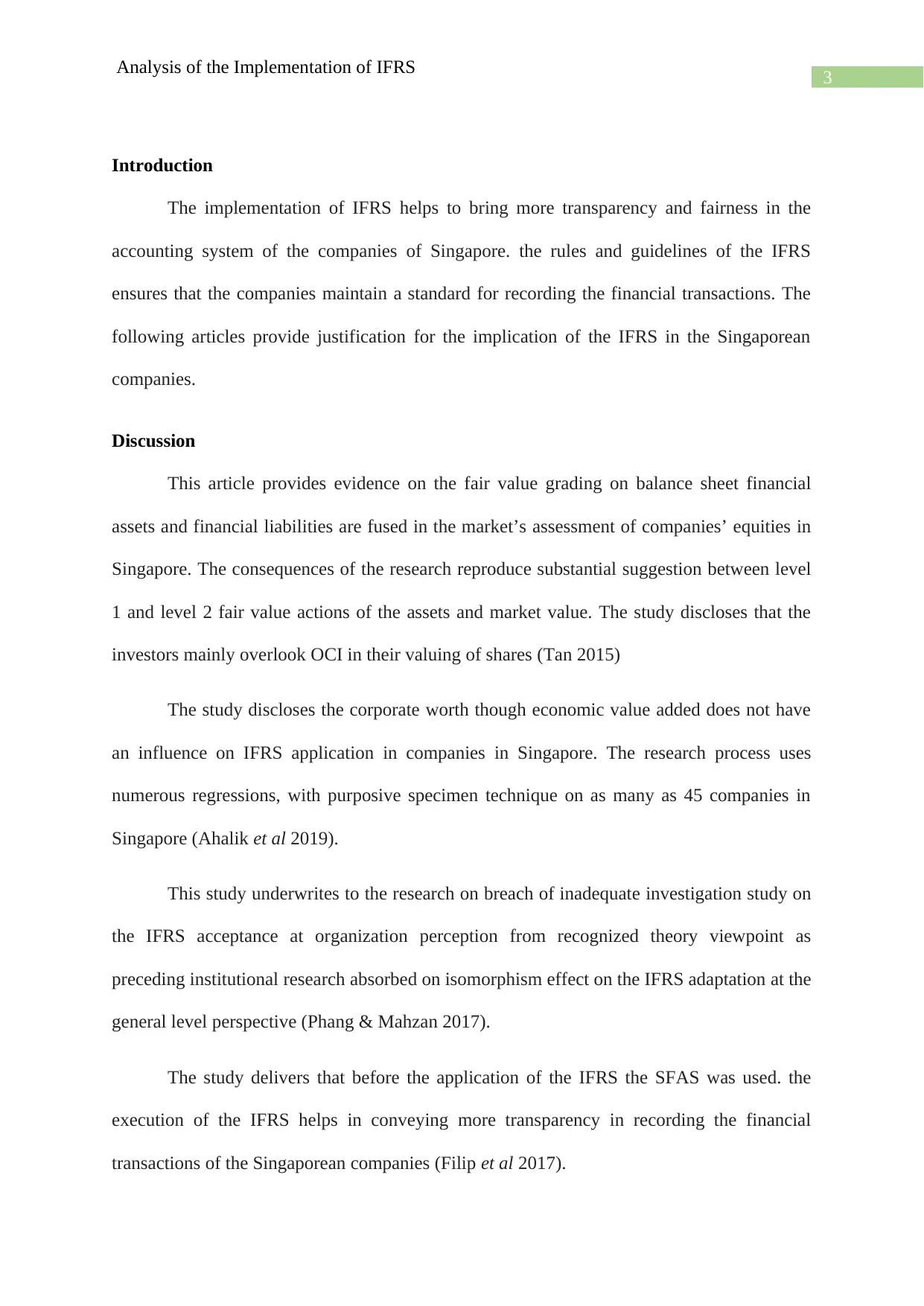
3
Analysis of the Implementation of IFRS
Introduction
The implementation of IFRS helps to bring more transparency and fairness in the
accounting system of the companies of Singapore. the rules and guidelines of the IFRS
ensures that the companies maintain a standard for recording the financial transactions. The
following articles provide justification for the implication of the IFRS in the Singaporean
companies.
Discussion
This article provides evidence on the fair value grading on balance sheet financial
assets and financial liabilities are fused in the market’s assessment of companies’ equities in
Singapore. The consequences of the research reproduce substantial suggestion between level
1 and level 2 fair value actions of the assets and market value. The study discloses that the
investors mainly overlook OCI in their valuing of shares (Tan 2015)
The study discloses the corporate worth though economic value added does not have
an influence on IFRS application in companies in Singapore. The research process uses
numerous regressions, with purposive specimen technique on as many as 45 companies in
Singapore (Ahalik et al 2019).
This study underwrites to the research on breach of inadequate investigation study on
the IFRS acceptance at organization perception from recognized theory viewpoint as
preceding institutional research absorbed on isomorphism effect on the IFRS adaptation at the
general level perspective (Phang & Mahzan 2017).
The study delivers that before the application of the IFRS the SFAS was used. the
execution of the IFRS helps in conveying more transparency in recording the financial
transactions of the Singaporean companies (Filip et al 2017).
Analysis of the Implementation of IFRS
Introduction
The implementation of IFRS helps to bring more transparency and fairness in the
accounting system of the companies of Singapore. the rules and guidelines of the IFRS
ensures that the companies maintain a standard for recording the financial transactions. The
following articles provide justification for the implication of the IFRS in the Singaporean
companies.
Discussion
This article provides evidence on the fair value grading on balance sheet financial
assets and financial liabilities are fused in the market’s assessment of companies’ equities in
Singapore. The consequences of the research reproduce substantial suggestion between level
1 and level 2 fair value actions of the assets and market value. The study discloses that the
investors mainly overlook OCI in their valuing of shares (Tan 2015)
The study discloses the corporate worth though economic value added does not have
an influence on IFRS application in companies in Singapore. The research process uses
numerous regressions, with purposive specimen technique on as many as 45 companies in
Singapore (Ahalik et al 2019).
This study underwrites to the research on breach of inadequate investigation study on
the IFRS acceptance at organization perception from recognized theory viewpoint as
preceding institutional research absorbed on isomorphism effect on the IFRS adaptation at the
general level perspective (Phang & Mahzan 2017).
The study delivers that before the application of the IFRS the SFAS was used. the
execution of the IFRS helps in conveying more transparency in recording the financial
transactions of the Singaporean companies (Filip et al 2017).
Paraphrase This Document
Need a fresh take? Get an instant paraphrase of this document with our AI Paraphraser
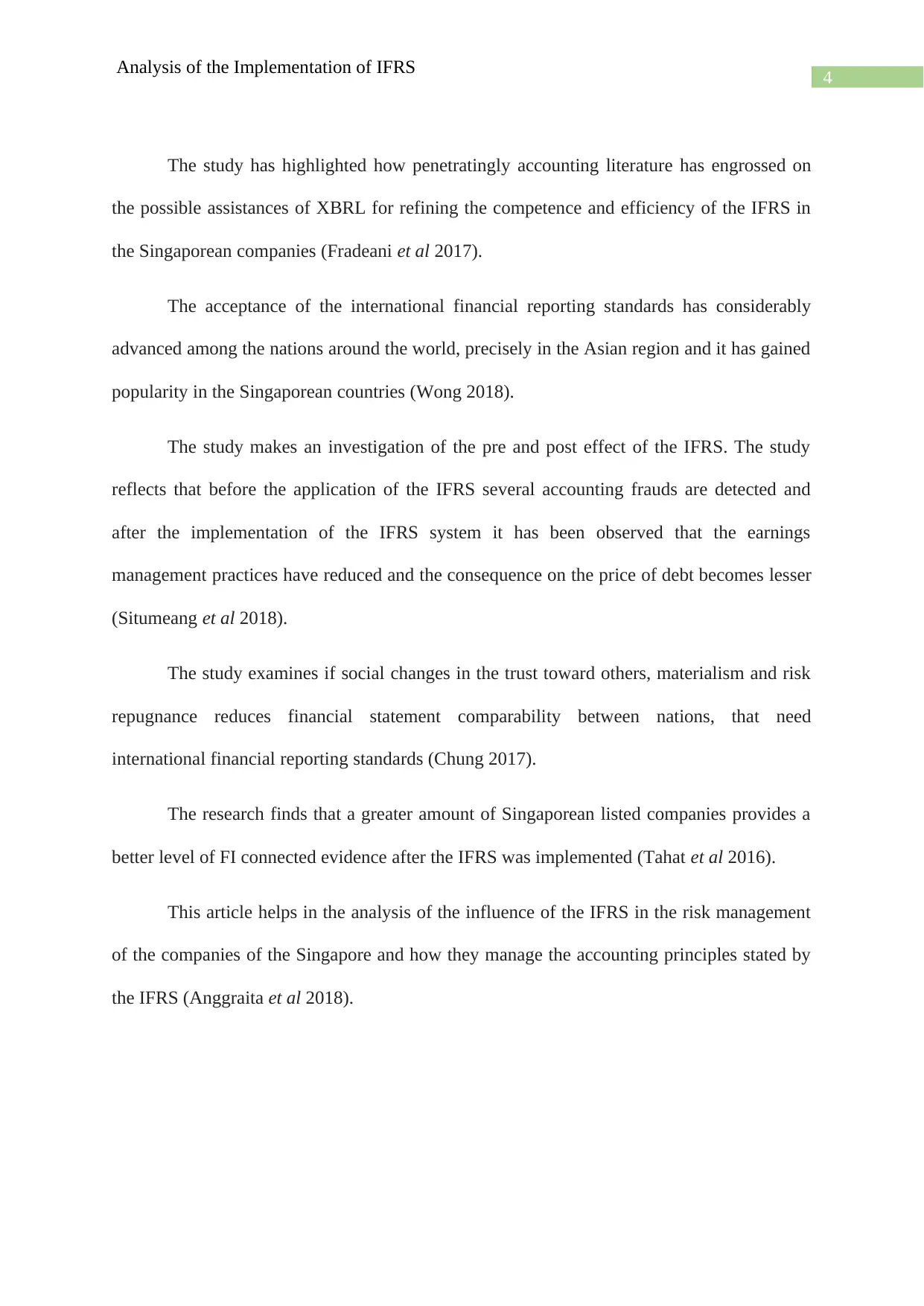
4
Analysis of the Implementation of IFRS
The study has highlighted how penetratingly accounting literature has engrossed on
the possible assistances of XBRL for refining the competence and efficiency of the IFRS in
the Singaporean companies (Fradeani et al 2017).
The acceptance of the international financial reporting standards has considerably
advanced among the nations around the world, precisely in the Asian region and it has gained
popularity in the Singaporean countries (Wong 2018).
The study makes an investigation of the pre and post effect of the IFRS. The study
reflects that before the application of the IFRS several accounting frauds are detected and
after the implementation of the IFRS system it has been observed that the earnings
management practices have reduced and the consequence on the price of debt becomes lesser
(Situmeang et al 2018).
The study examines if social changes in the trust toward others, materialism and risk
repugnance reduces financial statement comparability between nations, that need
international financial reporting standards (Chung 2017).
The research finds that a greater amount of Singaporean listed companies provides a
better level of FI connected evidence after the IFRS was implemented (Tahat et al 2016).
This article helps in the analysis of the influence of the IFRS in the risk management
of the companies of the Singapore and how they manage the accounting principles stated by
the IFRS (Anggraita et al 2018).
Analysis of the Implementation of IFRS
The study has highlighted how penetratingly accounting literature has engrossed on
the possible assistances of XBRL for refining the competence and efficiency of the IFRS in
the Singaporean companies (Fradeani et al 2017).
The acceptance of the international financial reporting standards has considerably
advanced among the nations around the world, precisely in the Asian region and it has gained
popularity in the Singaporean countries (Wong 2018).
The study makes an investigation of the pre and post effect of the IFRS. The study
reflects that before the application of the IFRS several accounting frauds are detected and
after the implementation of the IFRS system it has been observed that the earnings
management practices have reduced and the consequence on the price of debt becomes lesser
(Situmeang et al 2018).
The study examines if social changes in the trust toward others, materialism and risk
repugnance reduces financial statement comparability between nations, that need
international financial reporting standards (Chung 2017).
The research finds that a greater amount of Singaporean listed companies provides a
better level of FI connected evidence after the IFRS was implemented (Tahat et al 2016).
This article helps in the analysis of the influence of the IFRS in the risk management
of the companies of the Singapore and how they manage the accounting principles stated by
the IFRS (Anggraita et al 2018).
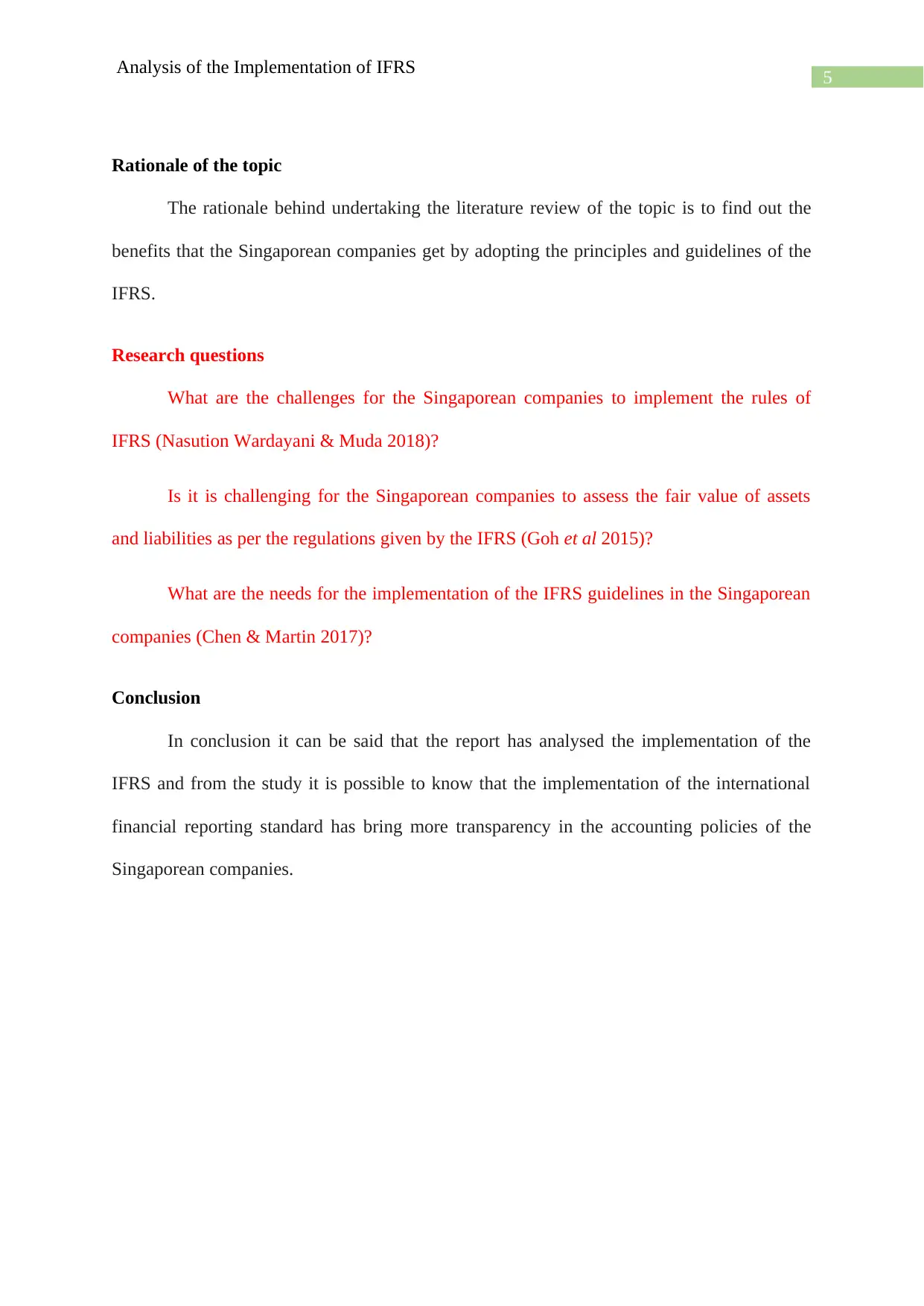
5
Analysis of the Implementation of IFRS
Rationale of the topic
The rationale behind undertaking the literature review of the topic is to find out the
benefits that the Singaporean companies get by adopting the principles and guidelines of the
IFRS.
Research questions
What are the challenges for the Singaporean companies to implement the rules of
IFRS (Nasution Wardayani & Muda 2018)?
Is it is challenging for the Singaporean companies to assess the fair value of assets
and liabilities as per the regulations given by the IFRS (Goh et al 2015)?
What are the needs for the implementation of the IFRS guidelines in the Singaporean
companies (Chen & Martin 2017)?
Conclusion
In conclusion it can be said that the report has analysed the implementation of the
IFRS and from the study it is possible to know that the implementation of the international
financial reporting standard has bring more transparency in the accounting policies of the
Singaporean companies.
Analysis of the Implementation of IFRS
Rationale of the topic
The rationale behind undertaking the literature review of the topic is to find out the
benefits that the Singaporean companies get by adopting the principles and guidelines of the
IFRS.
Research questions
What are the challenges for the Singaporean companies to implement the rules of
IFRS (Nasution Wardayani & Muda 2018)?
Is it is challenging for the Singaporean companies to assess the fair value of assets
and liabilities as per the regulations given by the IFRS (Goh et al 2015)?
What are the needs for the implementation of the IFRS guidelines in the Singaporean
companies (Chen & Martin 2017)?
Conclusion
In conclusion it can be said that the report has analysed the implementation of the
IFRS and from the study it is possible to know that the implementation of the international
financial reporting standard has bring more transparency in the accounting policies of the
Singaporean companies.
⊘ This is a preview!⊘
Do you want full access?
Subscribe today to unlock all pages.

Trusted by 1+ million students worldwide
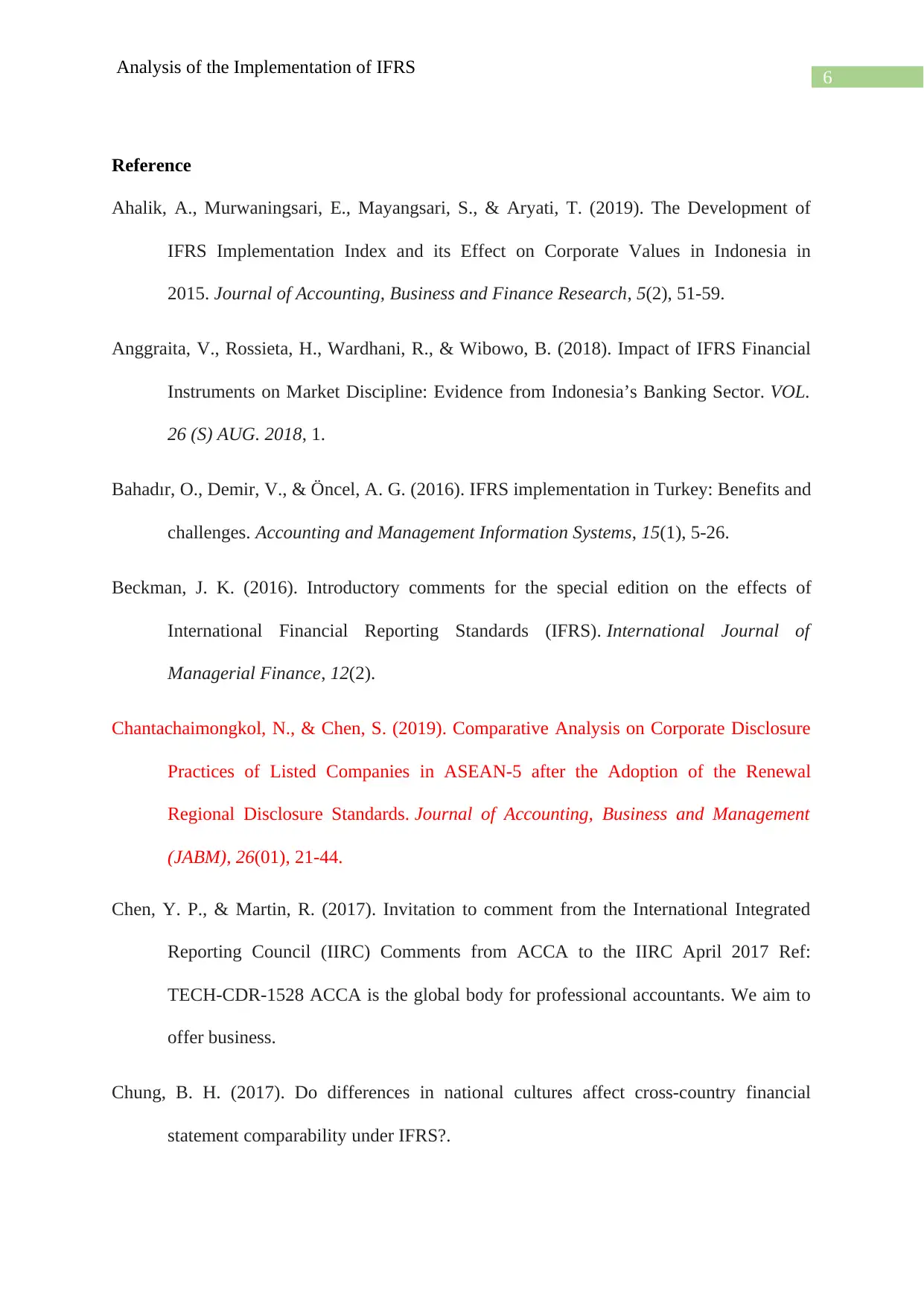
6
Analysis of the Implementation of IFRS
Reference
Ahalik, A., Murwaningsari, E., Mayangsari, S., & Aryati, T. (2019). The Development of
IFRS Implementation Index and its Effect on Corporate Values in Indonesia in
2015. Journal of Accounting, Business and Finance Research, 5(2), 51-59.
Anggraita, V., Rossieta, H., Wardhani, R., & Wibowo, B. (2018). Impact of IFRS Financial
Instruments on Market Discipline: Evidence from Indonesia’s Banking Sector. VOL.
26 (S) AUG. 2018, 1.
Bahadır, O., Demir, V., & Öncel, A. G. (2016). IFRS implementation in Turkey: Benefits and
challenges. Accounting and Management Information Systems, 15(1), 5-26.
Beckman, J. K. (2016). Introductory comments for the special edition on the effects of
International Financial Reporting Standards (IFRS). International Journal of
Managerial Finance, 12(2).
Chantachaimongkol, N., & Chen, S. (2019). Comparative Analysis on Corporate Disclosure
Practices of Listed Companies in ASEAN-5 after the Adoption of the Renewal
Regional Disclosure Standards. Journal of Accounting, Business and Management
(JABM), 26(01), 21-44.
Chen, Y. P., & Martin, R. (2017). Invitation to comment from the International Integrated
Reporting Council (IIRC) Comments from ACCA to the IIRC April 2017 Ref:
TECH-CDR-1528 ACCA is the global body for professional accountants. We aim to
offer business.
Chung, B. H. (2017). Do differences in national cultures affect cross-country financial
statement comparability under IFRS?.
Analysis of the Implementation of IFRS
Reference
Ahalik, A., Murwaningsari, E., Mayangsari, S., & Aryati, T. (2019). The Development of
IFRS Implementation Index and its Effect on Corporate Values in Indonesia in
2015. Journal of Accounting, Business and Finance Research, 5(2), 51-59.
Anggraita, V., Rossieta, H., Wardhani, R., & Wibowo, B. (2018). Impact of IFRS Financial
Instruments on Market Discipline: Evidence from Indonesia’s Banking Sector. VOL.
26 (S) AUG. 2018, 1.
Bahadır, O., Demir, V., & Öncel, A. G. (2016). IFRS implementation in Turkey: Benefits and
challenges. Accounting and Management Information Systems, 15(1), 5-26.
Beckman, J. K. (2016). Introductory comments for the special edition on the effects of
International Financial Reporting Standards (IFRS). International Journal of
Managerial Finance, 12(2).
Chantachaimongkol, N., & Chen, S. (2019). Comparative Analysis on Corporate Disclosure
Practices of Listed Companies in ASEAN-5 after the Adoption of the Renewal
Regional Disclosure Standards. Journal of Accounting, Business and Management
(JABM), 26(01), 21-44.
Chen, Y. P., & Martin, R. (2017). Invitation to comment from the International Integrated
Reporting Council (IIRC) Comments from ACCA to the IIRC April 2017 Ref:
TECH-CDR-1528 ACCA is the global body for professional accountants. We aim to
offer business.
Chung, B. H. (2017). Do differences in national cultures affect cross-country financial
statement comparability under IFRS?.
Paraphrase This Document
Need a fresh take? Get an instant paraphrase of this document with our AI Paraphraser
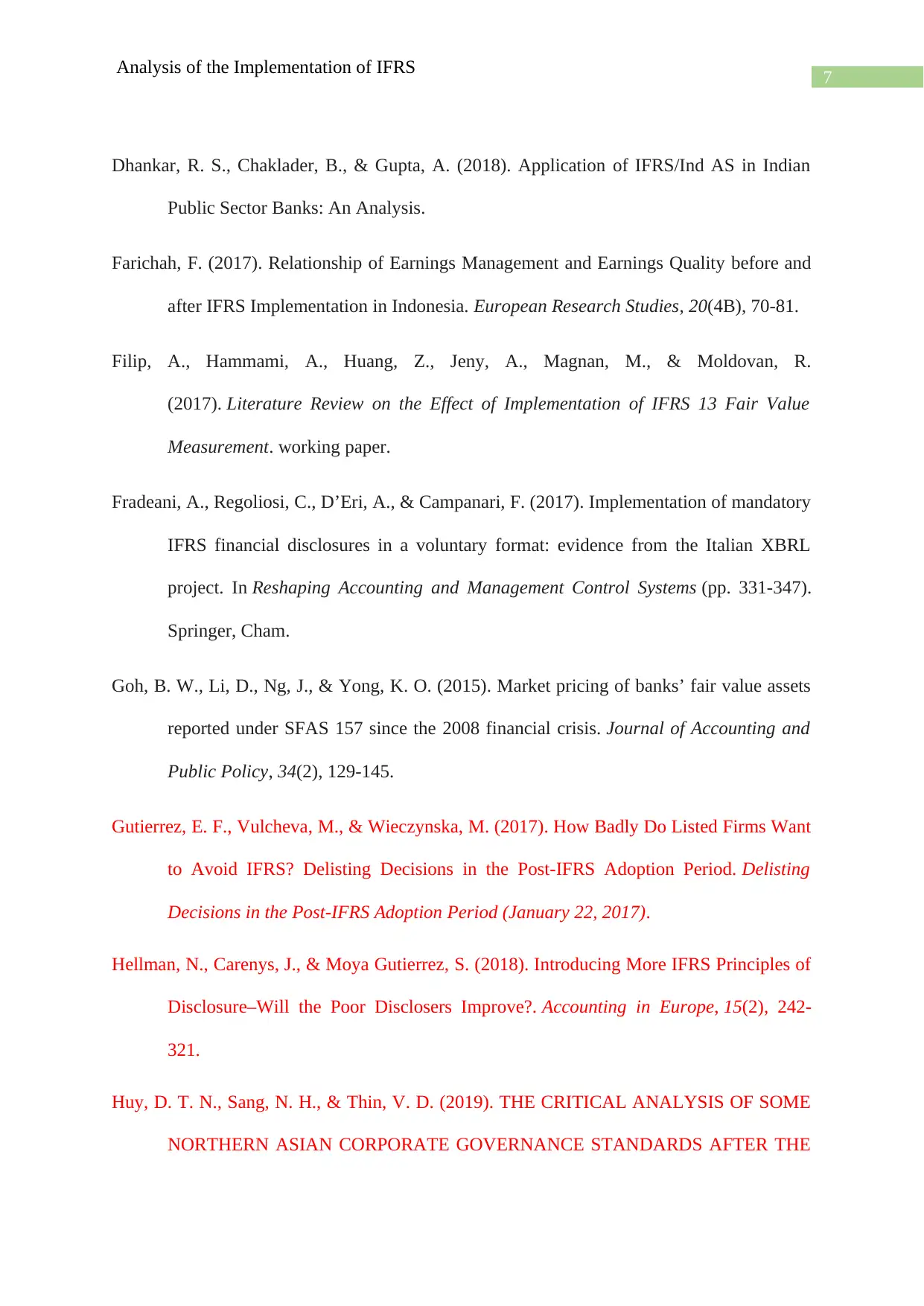
7
Analysis of the Implementation of IFRS
Dhankar, R. S., Chaklader, B., & Gupta, A. (2018). Application of IFRS/Ind AS in Indian
Public Sector Banks: An Analysis.
Farichah, F. (2017). Relationship of Earnings Management and Earnings Quality before and
after IFRS Implementation in Indonesia. European Research Studies, 20(4B), 70-81.
Filip, A., Hammami, A., Huang, Z., Jeny, A., Magnan, M., & Moldovan, R.
(2017). Literature Review on the Effect of Implementation of IFRS 13 Fair Value
Measurement. working paper.
Fradeani, A., Regoliosi, C., D’Eri, A., & Campanari, F. (2017). Implementation of mandatory
IFRS financial disclosures in a voluntary format: evidence from the Italian XBRL
project. In Reshaping Accounting and Management Control Systems (pp. 331-347).
Springer, Cham.
Goh, B. W., Li, D., Ng, J., & Yong, K. O. (2015). Market pricing of banks’ fair value assets
reported under SFAS 157 since the 2008 financial crisis. Journal of Accounting and
Public Policy, 34(2), 129-145.
Gutierrez, E. F., Vulcheva, M., & Wieczynska, M. (2017). How Badly Do Listed Firms Want
to Avoid IFRS? Delisting Decisions in the Post-IFRS Adoption Period. Delisting
Decisions in the Post-IFRS Adoption Period (January 22, 2017).
Hellman, N., Carenys, J., & Moya Gutierrez, S. (2018). Introducing More IFRS Principles of
Disclosure–Will the Poor Disclosers Improve?. Accounting in Europe, 15(2), 242-
321.
Huy, D. T. N., Sang, N. H., & Thin, V. D. (2019). THE CRITICAL ANALYSIS OF SOME
NORTHERN ASIAN CORPORATE GOVERNANCE STANDARDS AFTER THE
Analysis of the Implementation of IFRS
Dhankar, R. S., Chaklader, B., & Gupta, A. (2018). Application of IFRS/Ind AS in Indian
Public Sector Banks: An Analysis.
Farichah, F. (2017). Relationship of Earnings Management and Earnings Quality before and
after IFRS Implementation in Indonesia. European Research Studies, 20(4B), 70-81.
Filip, A., Hammami, A., Huang, Z., Jeny, A., Magnan, M., & Moldovan, R.
(2017). Literature Review on the Effect of Implementation of IFRS 13 Fair Value
Measurement. working paper.
Fradeani, A., Regoliosi, C., D’Eri, A., & Campanari, F. (2017). Implementation of mandatory
IFRS financial disclosures in a voluntary format: evidence from the Italian XBRL
project. In Reshaping Accounting and Management Control Systems (pp. 331-347).
Springer, Cham.
Goh, B. W., Li, D., Ng, J., & Yong, K. O. (2015). Market pricing of banks’ fair value assets
reported under SFAS 157 since the 2008 financial crisis. Journal of Accounting and
Public Policy, 34(2), 129-145.
Gutierrez, E. F., Vulcheva, M., & Wieczynska, M. (2017). How Badly Do Listed Firms Want
to Avoid IFRS? Delisting Decisions in the Post-IFRS Adoption Period. Delisting
Decisions in the Post-IFRS Adoption Period (January 22, 2017).
Hellman, N., Carenys, J., & Moya Gutierrez, S. (2018). Introducing More IFRS Principles of
Disclosure–Will the Poor Disclosers Improve?. Accounting in Europe, 15(2), 242-
321.
Huy, D. T. N., Sang, N. H., & Thin, V. D. (2019). THE CRITICAL ANALYSIS OF SOME
NORTHERN ASIAN CORPORATE GOVERNANCE STANDARDS AFTER THE
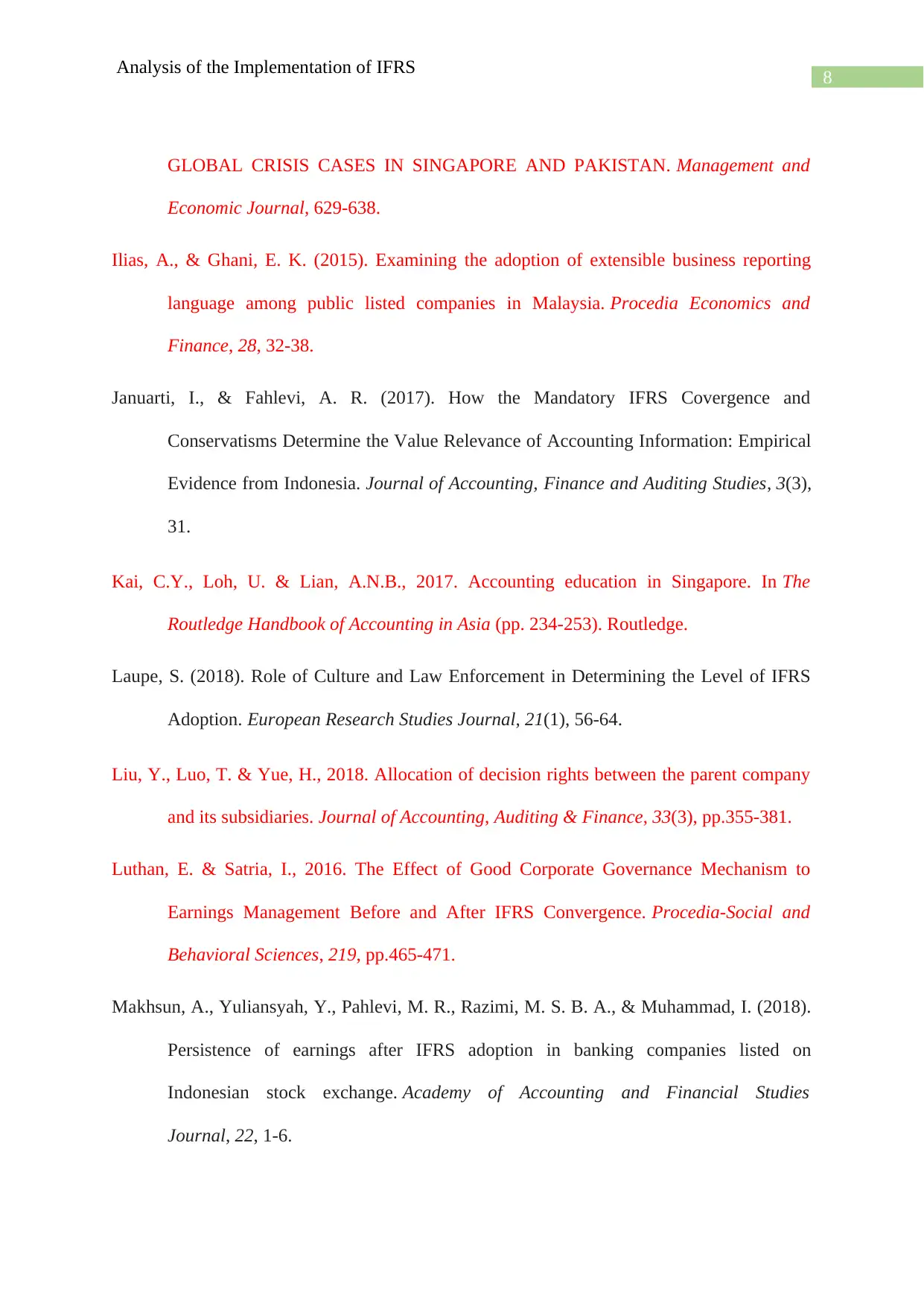
8
Analysis of the Implementation of IFRS
GLOBAL CRISIS CASES IN SINGAPORE AND PAKISTAN. Management and
Economic Journal, 629-638.
Ilias, A., & Ghani, E. K. (2015). Examining the adoption of extensible business reporting
language among public listed companies in Malaysia. Procedia Economics and
Finance, 28, 32-38.
Januarti, I., & Fahlevi, A. R. (2017). How the Mandatory IFRS Covergence and
Conservatisms Determine the Value Relevance of Accounting Information: Empirical
Evidence from Indonesia. Journal of Accounting, Finance and Auditing Studies, 3(3),
31.
Kai, C.Y., Loh, U. & Lian, A.N.B., 2017. Accounting education in Singapore. In The
Routledge Handbook of Accounting in Asia (pp. 234-253). Routledge.
Laupe, S. (2018). Role of Culture and Law Enforcement in Determining the Level of IFRS
Adoption. European Research Studies Journal, 21(1), 56-64.
Liu, Y., Luo, T. & Yue, H., 2018. Allocation of decision rights between the parent company
and its subsidiaries. Journal of Accounting, Auditing & Finance, 33(3), pp.355-381.
Luthan, E. & Satria, I., 2016. The Effect of Good Corporate Governance Mechanism to
Earnings Management Before and After IFRS Convergence. Procedia-Social and
Behavioral Sciences, 219, pp.465-471.
Makhsun, A., Yuliansyah, Y., Pahlevi, M. R., Razimi, M. S. B. A., & Muhammad, I. (2018).
Persistence of earnings after IFRS adoption in banking companies listed on
Indonesian stock exchange. Academy of Accounting and Financial Studies
Journal, 22, 1-6.
Analysis of the Implementation of IFRS
GLOBAL CRISIS CASES IN SINGAPORE AND PAKISTAN. Management and
Economic Journal, 629-638.
Ilias, A., & Ghani, E. K. (2015). Examining the adoption of extensible business reporting
language among public listed companies in Malaysia. Procedia Economics and
Finance, 28, 32-38.
Januarti, I., & Fahlevi, A. R. (2017). How the Mandatory IFRS Covergence and
Conservatisms Determine the Value Relevance of Accounting Information: Empirical
Evidence from Indonesia. Journal of Accounting, Finance and Auditing Studies, 3(3),
31.
Kai, C.Y., Loh, U. & Lian, A.N.B., 2017. Accounting education in Singapore. In The
Routledge Handbook of Accounting in Asia (pp. 234-253). Routledge.
Laupe, S. (2018). Role of Culture and Law Enforcement in Determining the Level of IFRS
Adoption. European Research Studies Journal, 21(1), 56-64.
Liu, Y., Luo, T. & Yue, H., 2018. Allocation of decision rights between the parent company
and its subsidiaries. Journal of Accounting, Auditing & Finance, 33(3), pp.355-381.
Luthan, E. & Satria, I., 2016. The Effect of Good Corporate Governance Mechanism to
Earnings Management Before and After IFRS Convergence. Procedia-Social and
Behavioral Sciences, 219, pp.465-471.
Makhsun, A., Yuliansyah, Y., Pahlevi, M. R., Razimi, M. S. B. A., & Muhammad, I. (2018).
Persistence of earnings after IFRS adoption in banking companies listed on
Indonesian stock exchange. Academy of Accounting and Financial Studies
Journal, 22, 1-6.
⊘ This is a preview!⊘
Do you want full access?
Subscribe today to unlock all pages.

Trusted by 1+ million students worldwide
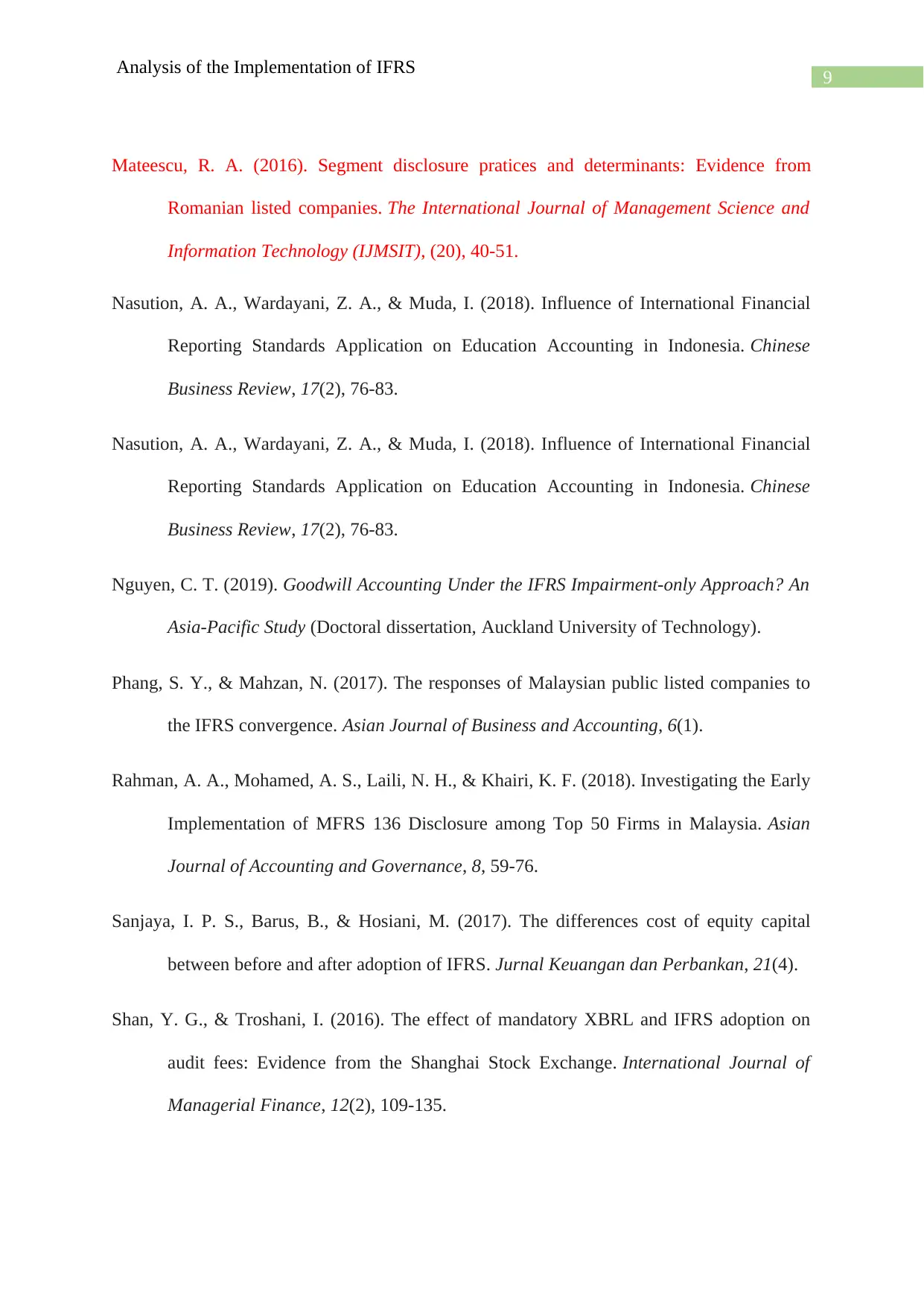
9
Analysis of the Implementation of IFRS
Mateescu, R. A. (2016). Segment disclosure pratices and determinants: Evidence from
Romanian listed companies. The International Journal of Management Science and
Information Technology (IJMSIT), (20), 40-51.
Nasution, A. A., Wardayani, Z. A., & Muda, I. (2018). Influence of International Financial
Reporting Standards Application on Education Accounting in Indonesia. Chinese
Business Review, 17(2), 76-83.
Nasution, A. A., Wardayani, Z. A., & Muda, I. (2018). Influence of International Financial
Reporting Standards Application on Education Accounting in Indonesia. Chinese
Business Review, 17(2), 76-83.
Nguyen, C. T. (2019). Goodwill Accounting Under the IFRS Impairment-only Approach? An
Asia-Pacific Study (Doctoral dissertation, Auckland University of Technology).
Phang, S. Y., & Mahzan, N. (2017). The responses of Malaysian public listed companies to
the IFRS convergence. Asian Journal of Business and Accounting, 6(1).
Rahman, A. A., Mohamed, A. S., Laili, N. H., & Khairi, K. F. (2018). Investigating the Early
Implementation of MFRS 136 Disclosure among Top 50 Firms in Malaysia. Asian
Journal of Accounting and Governance, 8, 59-76.
Sanjaya, I. P. S., Barus, B., & Hosiani, M. (2017). The differences cost of equity capital
between before and after adoption of IFRS. Jurnal Keuangan dan Perbankan, 21(4).
Shan, Y. G., & Troshani, I. (2016). The effect of mandatory XBRL and IFRS adoption on
audit fees: Evidence from the Shanghai Stock Exchange. International Journal of
Managerial Finance, 12(2), 109-135.
Analysis of the Implementation of IFRS
Mateescu, R. A. (2016). Segment disclosure pratices and determinants: Evidence from
Romanian listed companies. The International Journal of Management Science and
Information Technology (IJMSIT), (20), 40-51.
Nasution, A. A., Wardayani, Z. A., & Muda, I. (2018). Influence of International Financial
Reporting Standards Application on Education Accounting in Indonesia. Chinese
Business Review, 17(2), 76-83.
Nasution, A. A., Wardayani, Z. A., & Muda, I. (2018). Influence of International Financial
Reporting Standards Application on Education Accounting in Indonesia. Chinese
Business Review, 17(2), 76-83.
Nguyen, C. T. (2019). Goodwill Accounting Under the IFRS Impairment-only Approach? An
Asia-Pacific Study (Doctoral dissertation, Auckland University of Technology).
Phang, S. Y., & Mahzan, N. (2017). The responses of Malaysian public listed companies to
the IFRS convergence. Asian Journal of Business and Accounting, 6(1).
Rahman, A. A., Mohamed, A. S., Laili, N. H., & Khairi, K. F. (2018). Investigating the Early
Implementation of MFRS 136 Disclosure among Top 50 Firms in Malaysia. Asian
Journal of Accounting and Governance, 8, 59-76.
Sanjaya, I. P. S., Barus, B., & Hosiani, M. (2017). The differences cost of equity capital
between before and after adoption of IFRS. Jurnal Keuangan dan Perbankan, 21(4).
Shan, Y. G., & Troshani, I. (2016). The effect of mandatory XBRL and IFRS adoption on
audit fees: Evidence from the Shanghai Stock Exchange. International Journal of
Managerial Finance, 12(2), 109-135.
Paraphrase This Document
Need a fresh take? Get an instant paraphrase of this document with our AI Paraphraser
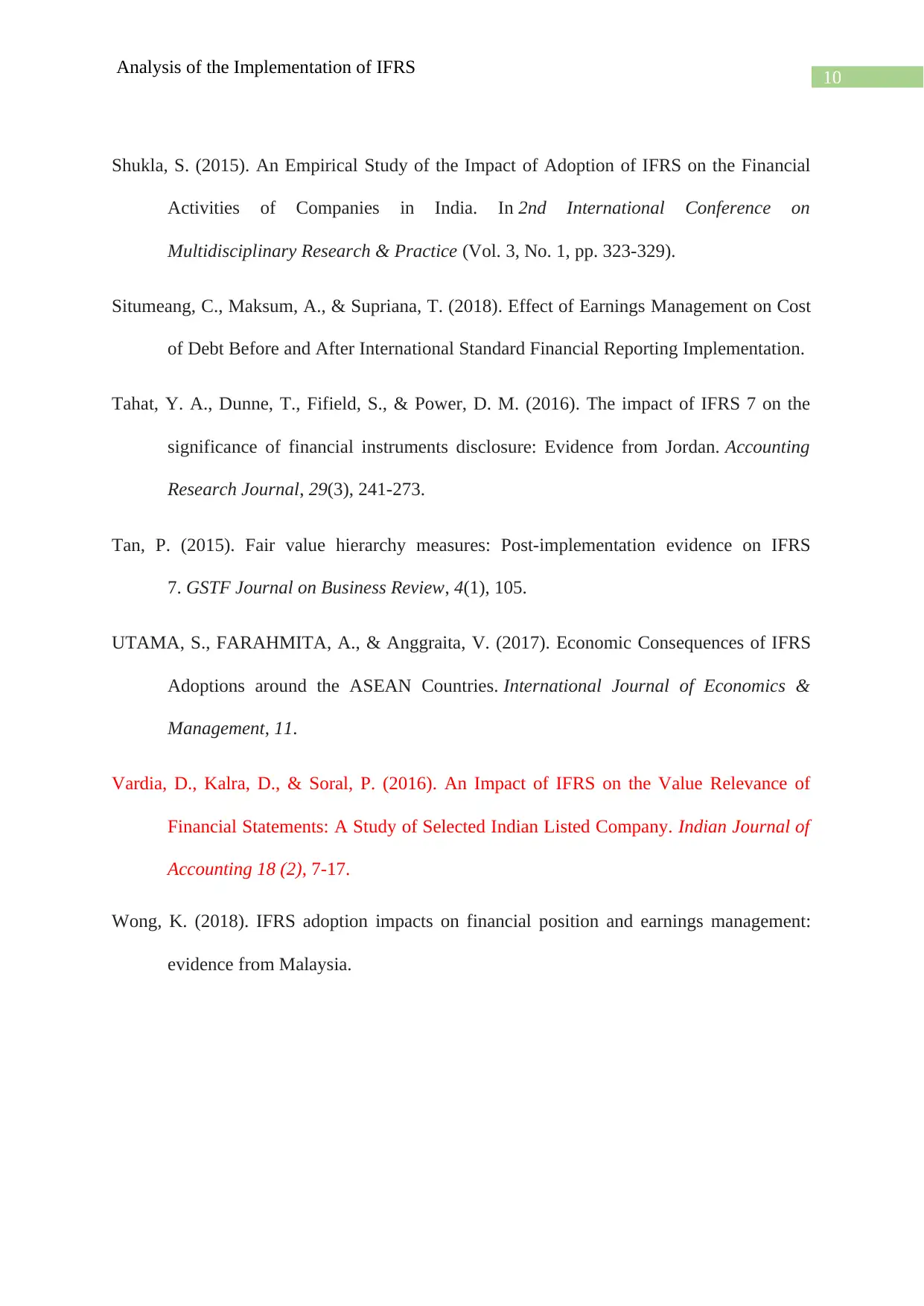
10
Analysis of the Implementation of IFRS
Shukla, S. (2015). An Empirical Study of the Impact of Adoption of IFRS on the Financial
Activities of Companies in India. In 2nd International Conference on
Multidisciplinary Research & Practice (Vol. 3, No. 1, pp. 323-329).
Situmeang, C., Maksum, A., & Supriana, T. (2018). Effect of Earnings Management on Cost
of Debt Before and After International Standard Financial Reporting Implementation.
Tahat, Y. A., Dunne, T., Fifield, S., & Power, D. M. (2016). The impact of IFRS 7 on the
significance of financial instruments disclosure: Evidence from Jordan. Accounting
Research Journal, 29(3), 241-273.
Tan, P. (2015). Fair value hierarchy measures: Post-implementation evidence on IFRS
7. GSTF Journal on Business Review, 4(1), 105.
UTAMA, S., FARAHMITA, A., & Anggraita, V. (2017). Economic Consequences of IFRS
Adoptions around the ASEAN Countries. International Journal of Economics &
Management, 11.
Vardia, D., Kalra, D., & Soral, P. (2016). An Impact of IFRS on the Value Relevance of
Financial Statements: A Study of Selected Indian Listed Company. Indian Journal of
Accounting 18 (2), 7-17.
Wong, K. (2018). IFRS adoption impacts on financial position and earnings management:
evidence from Malaysia.
Analysis of the Implementation of IFRS
Shukla, S. (2015). An Empirical Study of the Impact of Adoption of IFRS on the Financial
Activities of Companies in India. In 2nd International Conference on
Multidisciplinary Research & Practice (Vol. 3, No. 1, pp. 323-329).
Situmeang, C., Maksum, A., & Supriana, T. (2018). Effect of Earnings Management on Cost
of Debt Before and After International Standard Financial Reporting Implementation.
Tahat, Y. A., Dunne, T., Fifield, S., & Power, D. M. (2016). The impact of IFRS 7 on the
significance of financial instruments disclosure: Evidence from Jordan. Accounting
Research Journal, 29(3), 241-273.
Tan, P. (2015). Fair value hierarchy measures: Post-implementation evidence on IFRS
7. GSTF Journal on Business Review, 4(1), 105.
UTAMA, S., FARAHMITA, A., & Anggraita, V. (2017). Economic Consequences of IFRS
Adoptions around the ASEAN Countries. International Journal of Economics &
Management, 11.
Vardia, D., Kalra, D., & Soral, P. (2016). An Impact of IFRS on the Value Relevance of
Financial Statements: A Study of Selected Indian Listed Company. Indian Journal of
Accounting 18 (2), 7-17.
Wong, K. (2018). IFRS adoption impacts on financial position and earnings management:
evidence from Malaysia.
1 out of 11
Related Documents
Your All-in-One AI-Powered Toolkit for Academic Success.
+13062052269
info@desklib.com
Available 24*7 on WhatsApp / Email
![[object Object]](/_next/static/media/star-bottom.7253800d.svg)
Unlock your academic potential
Copyright © 2020–2026 A2Z Services. All Rights Reserved. Developed and managed by ZUCOL.





